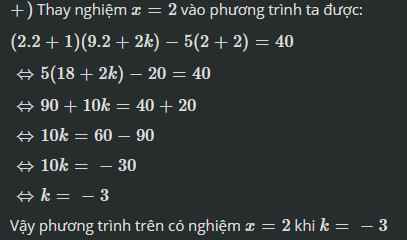tìm nghiệm của 2x^3 + x^2 + 2x +1
Hãy nhập câu hỏi của bạn vào đây, nếu là tài khoản VIP, bạn sẽ được ưu tiên trả lời.


\(x^2-3x-4=0\)
\(< =>x^2+x-4x-4=0\)
\(< =>x\left(x+1\right)-4\left(x+1\right)=0\)
\(< =>\left(x-4\right)\left(x+1\right)=0\)
\(< =>\orbr{\begin{cases}x=4\\x=-1\end{cases}}\)
\(2x^3-x^2-2x+1=0\)
\(< =>x^2\left(2x-1\right)-\left(2x-1\right)=0\)
\(< =>\left(x^2-1\right)\left(2x-1\right)=0\)
\(< =>\left(x-1\right)\left(x+1\right)\left(2x+1\right)=0\)
\(< =>\hept{\begin{cases}x=1\\x=-1\\x=-\frac{1}{2}\end{cases}}\)

\(P\left(x\right)+Q\left(x\right)=0\Leftrightarrow x^3-2x^2+3x+4-x^3+2x^2-2x-1=x+3=0\)
\(\Leftrightarrow x=-3\)

a. Thay x = 2 vào phương trình (2x + 1)(9x + 2k) – 5(x + 2) = 40, ta có:
(2.2+1)(9.2+2k)−5(2+2)=40⇔(4+1)(18+2k)−5.4=40⇔5(18+2k)−20=40⇔90+10k−20=40⇔10k=40−90+20⇔10k=−30⇔k=−3(2.2+1)(9.2+2k)−5(2+2)=40⇔(4+1)(18+2k)−5.4=40⇔5(18+2k)−20=40⇔90+10k−20=40⇔10k=40−90+20⇔10k=−30⇔k=−3
Vậy khi k = -3 thì phương trình (2x + 1)(9x + 2k) – 5(x + 2) = 40 có nghiệm x = 2
b. Thay x = 1 vào phương trình 2(2x+1)+18=3(x+2)(2x+k)2(2x+1)+18=3(x+2)(2x+k), ta có:
2(2.1+1)+18=3(1+2)(2.1+k)⇔2(2+1)+18=3.3(2+k)⇔2.3+18=9(2+k)⇔6+18=18+9k⇔24−18=9k⇔6=9k⇔k=69=232(2.1+1)+18=3(1+2)(2.1+k)⇔2(2+1)+18=3.3(2+k)⇔2.3+18=9(2+k)⇔6+18=18+9k⇔24−18=9k⇔6=9k⇔k=\(\frac{6}{9}\)=\(\frac{2}{3}\)
Vậy khi thì phương trình có nghiệm x = 1

Thay x = 1 vào phương trình 2(2x+1)+18=3(x+2)(2x+k)2(2x+1)+18=3(x+2)(2x+k), ta có:
2(2.1+1)+18=3(1+2)(2.1+k)
⇔2(2+1)+18=3.3(2+k)⇔2.3+18=9(2+k)
⇔6+18=18+9k⇔24−18=9k⇔6=9k
⇔k=69=232(2.1+1)+18=3(1+2)(2.1+k)
⇔2(2+1)+18=3.3(2+k)
⇔2.3+18=9(2+k)
⇔6+18=18+9k
⇔24−18=9k⇔6=9k
⇔k=\(\frac{6}{9}\)=\(\frac{2}{3}\)
Vậy khi thì phương trình có nghiệm x = 1

phương trình có nghiệm x=1
\(\Leftrightarrow3\left(k+2.1\right)\left(1+2\right)-2\left(2.1+1\right)=18\)
\(\Leftrightarrow k=-\dfrac{1}{3}\)

Ta có:
\({x^2} - 2x - 3 = 0 \Leftrightarrow (x + 1)(x - 3) = 0\)
\( \Leftrightarrow \left[ \begin{array}{l}x = - 1\\x = 3\end{array} \right. \Rightarrow E = \{ - 1;3\} \)
Lại có: \((x + 1)(2x - 3) = 0 \Leftrightarrow \left[ \begin{array}{l}x = - 1\\x = \frac{3}{2}\end{array} \right.\)
\( \Rightarrow G = \left\{ { - 1;\frac{3}{2}} \right\}\)
\( \Rightarrow P = E \cap G = \left\{ { - 1} \right\}\).
Xét phương trình \(x^2-2x-3=0\) có: \(a-b+c=0\)
\(\Rightarrow\left[{}\begin{matrix}x=-1\\x=-\dfrac{c}{a}=3\end{matrix}\right.\Rightarrow E=\left\{-1;3\right\}.\)
Xét phương trình \(\left(x+1\right)\left(2x-3\right)=0\)
\(\Rightarrow\left[{}\begin{matrix}x+1=0\\2x-3=0\end{matrix}\right.\Leftrightarrow\left[{}\begin{matrix}x=-1\\x=\dfrac{3}{2}\end{matrix}\right.\Rightarrow G=\left\{-1;\dfrac{3}{2}\right\}.\)
\(\Rightarrow P=E\cap G=\left\{-1\right\}.\)

\(a,\Leftrightarrow-4+k=-3\Leftrightarrow k=1\\ b,\Leftrightarrow-3\left(2k-18\right)=40\\ \Leftrightarrow2k-18=-\dfrac{40}{3}\Leftrightarrow k=\dfrac{7}{3}\\ c,\Leftrightarrow10+18=9\left(2+k\right)\\ \Leftrightarrow k+2=\dfrac{28}{9}\Leftrightarrow k=\dfrac{10}{9}\)

a)Đặt A (x) = 0
hay \(3x-6=0\)
\(3x\) \(=6\)
\(x\) \(=6:3\)
\(x\) \(=2\)
Vậy \(x=2\) là nghiệm của A (x)
b) Đặt B (x) = 0
hay \(2x-10=0\)
\(2x\) \(=10\)
\(x\) \(=10:2\)
\(x\) \(=5\)
Vậy \(x=5\) là nghiệm của B (x)
c) Đặt C (x) = 0
hay \(x^2-1=0\)
\(x^2\) \(=1\)
\(x^2\) \(=1:1\)
\(x^2\) \(=1\)
\(x\) \(=\overset{+}{-}1\)
Vậy \(x=1;x=-1\) là nghiệm của C (x)
d) Đặt D (x) = 0
hay \(\left(x-2\right).\left(x+3\right)=0\)
⇒ \(x-2=0\) hoặc \(x+3=0\)
* \(x-2=0\) * \(x+3=0\)
\(x\) \(=0+2\) \(x\) \(=0-3\)
\(x\) \(=2\) \(x\) \(=-3\)
Vậy \(x=2\) hoặc \(x=-3\) là nghiệm của D (x)
e) Đặt E (x) = 0
hay \(x^2-2x=0\)
⇔\(\left[{}\begin{matrix}x^2-2x\\\left(x-2\right)x\end{matrix}\right.\)
⇒\(\left(x-2\right)x\)
⇔ \(x.\left(2x-1\right)=0\)
⇔ \(\left[{}\begin{matrix}x=0\\2x-1=0\end{matrix}\right.\)
\(\left\{{}\begin{matrix}x=0\\x=2\end{matrix}\right.\)
Vậy \(x=0\) hoặc \(x=2\) là nghiệm của E (x)
f) Đặt F (x) = 0
hay \(\left(x^2\right)+2=0\)
\(x^2\) \(=0-2\)
\(x^2\) \(=-2\)
\(x\) \(=\overset{-}{+}-2\)
Do \(\overset{+}{-}-2\) không bằng 0 nên F (x) không có nghiệm
Vậy đa thức F (x) không có nghiệm
g) Đặt G (x) = 0
hay \(x^3-4x=0\)
⇔\(\left[{}\begin{matrix}x^3-4x\\\left(x-4\right)x^2\end{matrix}\right.\)
⇒ \(\left(x-4\right)x^2=0\)
⇔ \(x.\left(4x-1\right)=0\)
⇔\(\left[{}\begin{matrix}x=0\\4x-1=0\end{matrix}\right.\)
\(\left\{{}\begin{matrix}x=0\\x=\dfrac{1}{4}\end{matrix}\right.\)
Vậy \(x=0\) hoặc \(x=\dfrac{1}{4}\) là nghiệm của G (x)
h) Đặt H (x) = 0
hay \(3-2x=0\)
\(2x\) \(=3+0\)
\(2x\) \(=3\)
\(x\) \(=3:2\)
\(x\) \(=\dfrac{3}{2}\)
Vậy \(x=\dfrac{3}{2}\) là nghiệm của H (x)
CÂU G) MIK KHÔNG BIẾT CÓ 2 NGHIỆM HAY LÀ 3 NGHIỆM NỮA

\(2x^3+x^2+2x+1=0\)
\(\Leftrightarrow x^2\cdot\left(2x+1\right)+2x+1=0\)
\(\Leftrightarrow\left(2x+1\right)\left(x^2+1\right)=0\)
\(\Leftrightarrow\left[{}\begin{matrix}2x+1=0\\x^2+1=0\left(VN\right)\end{matrix}\right.\)
\(\Leftrightarrow x=-\dfrac{1}{2}\)
Ta có: \(2x^3+x^2+2x+1=0\)
\(\Leftrightarrow x^2\left(2x+1\right)+\left(2x+1\right)=0\)
\(\Leftrightarrow2x+1=0\)
hay \(x=-\dfrac{1}{2}\)